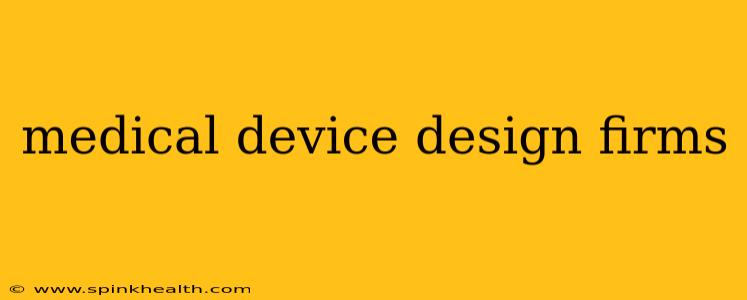Navigating the World of Medical Device Design Firms: A Journey from Idea to Innovation
The journey of a medical device, from a spark of an idea to a life-saving reality, is a complex and often challenging one. This journey rarely happens in isolation; it requires expertise, collaboration, and a deep understanding of regulatory hurdles. That's where medical device design firms come in. These specialized firms are the architects of innovation, transforming groundbreaking concepts into functional, safe, and effective medical devices. But choosing the right firm is crucial. This guide delves into the world of medical device design firms, answering key questions to help you make the best decision for your project.
What exactly do medical device design firms do?
Imagine a brilliant doctor with a revolutionary idea for a new surgical tool, but lacking the technical expertise to bring it to life. This is where the magic of medical device design firms begins. These firms aren't just designers; they are problem-solvers, engineers, regulatory experts, and manufacturing consultants all rolled into one. They take your initial concept, whether a rough sketch on a napkin or a detailed technical document, and shepherd it through each stage of development, from ideation and prototyping to testing and regulatory approval. They possess a unique blend of medical expertise, engineering prowess, and regulatory knowledge, making them indispensable partners in bringing life-changing medical technologies to market.
What are the key services offered by medical device design firms?
Medical device design firms offer a comprehensive suite of services tailored to the specific needs of their clients. This typically includes:
- Concept Development and Ideation: Helping you refine your initial idea, exploring feasibility, and identifying potential challenges early on.
- Design and Engineering: Creating detailed 3D models, selecting appropriate materials, and ensuring the device meets all functional requirements.
- Prototyping and Testing: Building prototypes to test functionality, usability, and safety, iteratively refining the design based on the results.
- Regulatory Affairs: Navigating the complex landscape of FDA regulations and other international standards, ensuring your device meets all compliance requirements.
- Manufacturing Support: Assisting with the selection of manufacturers, overseeing the production process, and ensuring quality control.
How do I choose the right medical device design firm for my project?
Selecting the right firm is paramount. Here's a breakdown of crucial factors to consider:
1. Experience and Expertise:
- Specific device type: Does the firm have proven experience designing devices similar to yours? A firm specializing in cardiovascular devices might not be the best fit for a neurological implant.
- Regulatory expertise: Navigating regulatory pathways is crucial. Choose a firm with a strong track record of successful FDA submissions.
- Team capabilities: Look for a team with diverse expertise, including mechanical engineers, electrical engineers, software engineers, and regulatory specialists.
2. Portfolio and References:
- Case studies: Review the firm's past projects to gauge their design capabilities and understanding of your specific area.
- Client testimonials: Speak with previous clients to gain insights into their experience working with the firm.
3. Communication and Collaboration:
- Project management: Ensure the firm has a robust project management system to keep you informed and involved throughout the process.
- Responsiveness: How quickly does the firm respond to your inquiries and concerns? Effective communication is vital.
What are the common challenges faced when working with medical device design firms?
While the collaboration is typically fruitful, challenges can arise:
- Communication gaps: Misunderstandings can occur if expectations are not clearly defined upfront. Establish open and frequent communication channels.
- Budget overruns: Thoroughly discuss the budget and timelines before commencing the project. Unexpected complications can arise, so ensure flexibility is built into the plan.
- Regulatory hurdles: Navigating FDA regulations can be complex and time-consuming. Choose a firm with proven expertise in this area.
What are the different types of medical device design firms?
Medical device design firms range in size and specialization. Some are small boutique firms focusing on niche areas, while others are large multinational corporations offering a broader range of services. The type of firm you choose will depend on your specific needs and the complexity of your project.
What is the typical cost of working with a medical device design firm?
The cost varies greatly depending on the scope of the project, the complexity of the device, and the firm's hourly rates. It is essential to get detailed quotes from multiple firms before making a decision.
By carefully considering these factors and asking the right questions, you can successfully navigate the world of medical device design firms and bring your innovative medical device to life. Remember, choosing the right partner is crucial to the success of your project and its impact on patients' lives.

